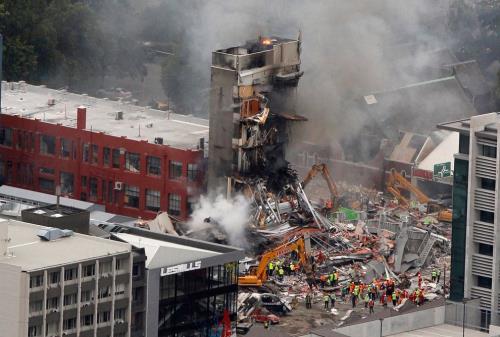There has been a lot of media coverage recently regarding tragic workplace fatalities in New Zealand. This year alone WorkSafe reported 25 work-related deaths. In the wake of these deaths there have been several calls for better investigations into the incidents and harsher penalties for those found guilty.
 Current law
Current law
New Zealand's health and safety law, the Health and Safety at Work Act 2015 (HSWA) is intended to protect workers' health and safety, promote health and safety practices and education and to provide effective and appropriate compliance and enforcement measures.
These measures include a penalty for engaging in reckless conduct that exposes others to risk of death, serious injury or illness. Individuals could face up to five years imprisonment and a $600,000 fine, and companies can be liable for a fine up to $3 million. There is no offence under the criminal law regime for such conduct.
Corporate Manslaughter
Corporate manslaughter was not added to HSWA because the National-led Government majority recommended against introducing it. However, corporate Manslaughter laws exist in the UK and Canada, and in some states in Australia.
Corporate manslaughter means corporate entities can be convicted of the criminal offence of manslaughter and face substantial fines. For instance, in the UK the fine can be up to 10% of a business's annual revenue. Such laws also typically create a similar offence for senior executives - however because these are individuals there may also be the possibility of lengthy prison sentences.
Just last week, the Brisbane District Court handed down the first sentence under Queensland's industrial manslaughter law. An auto wrecking yard was ordered to pay $3 million over the death of a worker who was pinned between a forklift and a truck in May 2019. The two directors of the company were sentenced to 10 months imprisonment, wholly suspended, after pleading guilty to engaging in reckless conduct. Just days ago, a similar law came into effect in Victoria, with a maximum fine of $16.5 million and individuals can face up to 20 years in prison.
Although New Zealand does not have a corporate manslaughter offence, the same sentence would be possible under our existing health and safety laws. Currently, commonly the penalties faced by companies when investigated for work-related deaths does not come close to the maximum penalties available. It should be anticipated that these are likely to increase and that prosecutions should be expected against individuals if the circumstances warrant it.
Issues with investigations into work-related deaths
Regardless of the penalties available under the law, much of the prosecution under the HSWA involves an investigation by WorkSafe. Successful prosecution relies on the evidence gathered in that investigation.
There have been several news reports of families feeling like they did not get justice for the deaths of their family members in workplace accidents, citing flaws in the investigations.
An independent report found a number of weaknesses in the approach and practices of WorkSafe investigators. The report identified shortcomings relating to a lack of investigators, lack of training, and slack handling of exhibits.
The future
The independent report prompted a $5 million improvement programme to improve WorkSafe investigations and the hiring of additional staff.
In addition to the improvement programme, WorkSafe recently developed its Data Centre to more accurately calculate the number of work-related deaths in New Zealand. This resulted in a 40% increase in the number of deaths recorded between 2013-2018.
There has been no corporate manslaughter bill introduced to Parliament, despite renewed calls in the wake of the Whakaari White Island tragedy.
This is no doubt an ongoing issue, and we are likely to see continued efforts to reduce the number of workplace fatalities in New Zealand.

